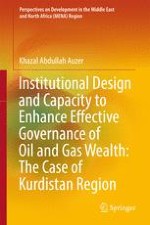2017 | OriginalPaper | Buchkapitel
3. Transmission Channels of the ‘Resource Curse’ Reappraised
verfasst von : Khazal Abdullah Auzer
Erschienen in: Institutional Design and Capacity to Enhance Effective Governance of Oil and Gas Wealth: The Case of Kurdistan Region
Verlag: Springer Singapore
Aktivieren Sie unsere intelligente Suche, um passende Fachinhalte oder Patente zu finden.
Wählen Sie Textabschnitte aus um mit Künstlicher Intelligenz passenden Patente zu finden. powered by
Markieren Sie Textabschnitte, um KI-gestützt weitere passende Inhalte zu finden. powered by
